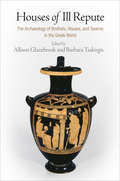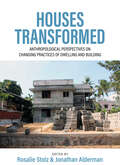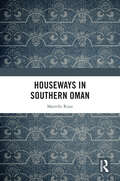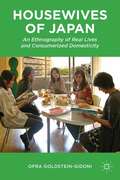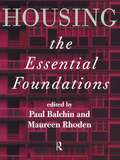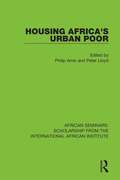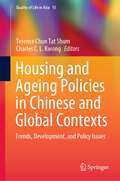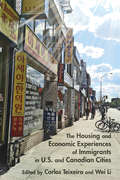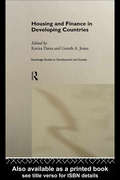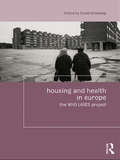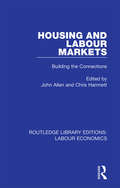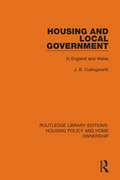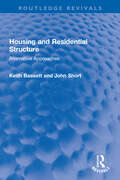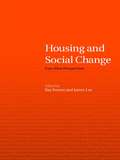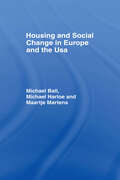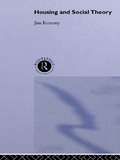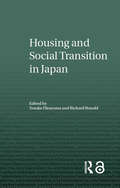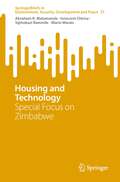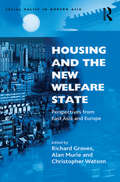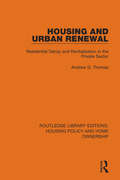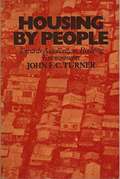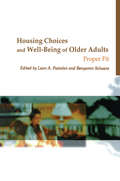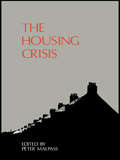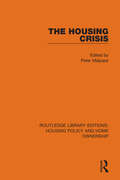- Table View
- List View
Houses of Ill Repute: The Archaeology of Brothels, Houses, and Taverns in the Greek World
by Allison Glazebrook Barbara TsakirgisThe study of ancient Greek urbanism has moved from examining the evidence for town planning and the organization of the city-state, or polis, to considerations of "everyday life." That is, it has moved from studying the public (fortifications, marketplaces, council houses, gymnasiums, temples, theaters, fountain houses) to studying the private (the physical remains of Greek houses). But what of those buildings that housed activities neither public nor private—brothels, taverns, and other homes of illicit activity? Can they be distinguished from houses? Were businesses like these run from homes? Classical Athenian writers attest to a diverse urban landscape that included tenement houses (sunoikiai), inns (diaitai, pandokeia), factories (ergasteria), taverns (kapelia), gambling dens (skirapheia), training schools (didaskaleia), and brothels (porneia), yet, despite our knowledge of specific terms, associating them with actual physical remains has not been easy. One such writer, Isaeus, mentions tenement houses that hosted prostitutes and wine sellers, while his contemporary Aeschines refers to doctors, smiths, fullers, carpenters, and pimps renting space. Were tenement houses not simply multi-inhabitant spaces but also multipurpose ones?Houses of Ill Repute is the first book to focus on the difficulties of distinguishing private and semiprivate spaces. While others have studied houses or brothels, this volume looks at both together. The chapters, by leading scholars in the field, address such questions as "What is a house?" and "Did the business of prostitution leave behind a unique archaeological record?" Presenting several approaches to identifying and studying distinctions between domestic residences and houses of ill repute, and drawing on the fields of literature, history, and art history and theory, the volume's contributors provide a way forward for the study of domestic and entertainment spaces in the Hellenic world.Contributors: Bradley A. Ault, Allison Glazebrook, Mark L. Lawall, Kathleen M. Lynch, David Scahill, Amy C. Smith, Monika Trümper, Barbara Tsakirgis.
Houses Transformed: Anthropological Perspectives on Changing Practices of Dwelling and Building
by Jonathan Alderman Rosalie StolzOver the decades, there has been a world-wide transformation of so-called ‘vernacular houses’. Based on ethnographic accounts from different regions, Houses Transformed investigates the changing practices of building houses in a transnational context. It explores the intersection of house biographies and social change, the politics of housing design, the social fabrication of aspirational houses, the domestication of concrete and the intersection of materiality and ontology as well as the rhetoric of the vernacular. The volume provides new anthropological pathways to understanding the dynamics of dwelling in the 21st century.
Houseways in Southern Oman
by Marielle RisseThis book explores how houses are created, maintained and conceptualized in southern Oman. Based on long-term research in the Dhofar region, it draws on anthropology, sociology, urban studies and architectural history. The chapters consider physical and functional aspects, including regulations governing land use, factors in siting houses, architectural styles and norms for interior and exterior decorating. The volume also reflects on cultural expectations regarding how and when rooms are used and issues such as safety, privacy, social connectedness and ease of movement. Houses and residential areas are situated within the fabric of towns, comparison is made with housing in other countries in the Arabian peninsula, and consideration is given to notions of the ‘Islamic city’ and the ‘Islamic house’. The book is valuable reading for scholars interested in the Middle East and the built environment.
Housewife: Why Women Still Do It All and What to Do Instead
by Lisa Selin DavisAmazon's Best Nonfiction Book of the Month for March 2024 Discover the complete social history of the housewife archetype, from colonial America to the 20th century, and re-examine common myths about the &“modern woman.&” The notion of &“housewife&” evokes strong reactions. For some, it&’s nostalgia for a bygone era, simpler and better times when men were breadwinners and women remained home with the kids. For others, it&’s a sexist, oppressive stereotype of women&’s work. Either way, housewife is a long outdated concept—or is it? Lisa Selin Davis, known for her smart, viral, feminist, cultural takes, argues that the &“breadwinner vs. homemaker&” divide is a myth. She charts examples from prehistoric female hunters to working class housewives in the 1930s, from First Ladies to 21st century stay-at-home moms, on a search for answers to the problems of what is referred to as women&’s work and motherhood. Davis discovers that women have been sold a lie about what families should be. Housewife unveils a truth: interdependence, rather than independence, is the American way. The book is a clarion call for all women—married or single, mothers or childless—and for men, too, to push for liberation. In Housewife, Davis builds a case for systemic, cultural, and personal change, to encourage women to have the power to choose the best path for themselves.
Housewives of Japan
by Ofra Goldstein-GidoniWomen in postwar Japan have never felt completely free from the social role and cultural concept of the housewife. Drawing on a unique ethnographic inquiry, Ofra Goldstein-Gidoni explores the complexities of the relationship between socially and culturally constructed roles bestowed on Japanese women and their real lives. With a novel approach to the use of the Internet and email in the production of ethnographic knowledge, this book gives voice to the lives and thoughts of "professional housewives. "
Housing: An Introduction
by Maureen Rhoden Paul BalchinHousing: The Essential Foundations provides a comprehensive introduction to housing studies. This topical text is essential reading for students embarking on degree and diploma courses in housing, surveying, town planning and other related subjects. Professionals within these fields will also find the book valuable as a source of up-to-date information and data. Uniquely multi-disciplinary and including a wealth of illustrations and examples, this book focuses on key topics which include: * equal opportunities and housing organisations * town planning and housing development * housing management, design and development * economics of housing * management and organisation * environmental health and housing * property, housing law, policy-making and politics * housing policy and finance prior to and post Thatcherism * future policy issues under the Labour government post 1997 Throughout the authors stress the importance of housing market activity that accords with good planning practice, legislation, democratic decision-making, economy and efficiency. In introducing the many diverse aspects of housing within a single volume, this book provides the essential foundations for the study of this multi-disciplinary subject. Paul Balchin, Gregory Bull, Pauline Forrester, David Isaac, R.Shean McConnell John O'Leary, Maureen Rhoden, Jane Weldon all at Univeristy of Greenwich, UK and Mark Pawlowski, University
Housing Africa's Urban Poor (African Seminars: Scholarship from the International African Institute #2)
by Philip Amis Peter LloydOriginally published in 1990, this book reveals the extent to which petty landlordism is developing not just in the African urban settlements that have sprung up but in government-sponsored low-cost housing estates. The first part of the book traces African governments' changing responses to urban growth since the 1960s. The second presents case studies of housing markets and landlord-tenant relations north and south of the Sahara. The third examines World Bank involvement, and the book ends by considering policy implications.
Housing and Ageing Policies in Chinese and Global Contexts: Trends, Development, and Policy Issues (Quality of Life in Asia #15)
by Terence Chun Tat Shum Charles C. L. KwongMotivated by the rapid increase in housing demand and the population of older adults worldwide, this book provides an interdisciplinary and multi-level approach for studying housing and ageing issues and relevant policy analysis in China, and beyond. Specifically, it highlights how the changing social, economic, and political factors at both local and global levels affect the housing or ageing experiences of people. Drawing on findings and theoretical discussions in economics, history, psychology, sociology, social policy, and urban studies, the authors offer interdisciplinary perspectives on a highly topical debate, asking what progress is being made on the formulation and implementation of housing and ageing policies in different societies. The book brings together original qualitative and quantitative research works in European, Asia-Pacific and Chinese contexts. Readers will benefit from the results of a rigorous analysis of data and case studies that reveal factors affecting housing or ageing experiences of people in these regions. The interdisciplinary research also provides valuable insights on further policy analyses and formulation in both local and global contexts. It is of interest to scholars, policy makers and university students in the fields of housing, ageing, and social and public policy.
The Housing and Economic Experiences of Immigrants in U.S. and Canadian Cities
by Carlos Teixeira Wei LiSince the 1960s, new and more diverse waves of immigrants have changed the demographic composition and the landscapes of North American cities and their suburbs. The Housing and Economic Experiences of Immigrants in U.S. and Canadian Cities is a collection of essays examining how recent immigrants have fared in getting access to jobs and housing in urban centres across the continent.Using a variety of methodologies, contributors from both countries present original research on a range of issues connected to housing and economic experiences. They offer both a broad overview and a series of detailed case studies that highlight the experiences of particular communities. This volume demonstrates that, while the United States and Canada have much in common when it comes to urban development, there are important structural and historical differences between the immigrant experiences in these two countries.
Housing and Finance in Developing Countries (Routledge Studies in Development and Society #Vol. 7)
by Kavita Datta Gareth JonesThis book explores the linkages between formal and informal housing finance drawing upon the lessons of NGO and micro-finance practices. Both public and private formal finance institutions have experienced great difficulty in lending below a middle-income client group, and are often reluctant to lend for the purpose of housing at all. This failure of formal finance to filter down to low-income households, and in particular to women, has led various NGOs and community groups to create and adopt innovative finance programmes, such as informal savings banks and credit rotating schemes. The authors critically assess the impact of theses schemes, and evaluate links between gender, housing and finance.
Housing and Health in Europe: The WHO LARES project (Housing and Society Series)
by David OrmandyIn this cross-disciplinary research David Ormandy and expert contributors explain the nature and development of the World Health Organization's study of housing across Europe. In-depth analysis provides new evidence of links between the health of inhabitants and their housing conditions, with focus on critical topics such as: indoor air pollution the effect of cold homes and dampness noise effects domestic accidents. With practical examples of survey tools, the attention given to methodological approaches makes this text an important resource for policy professionals as well as housing, planning and public health academics.
Housing and Labour Markets: Building the Connections (Routledge Library Editions: Labour Economics #1)
by John Allen Chris HamnettFirst published in 1991. The connection between housing and work is one of the most discussed yet least understood aspects of modern society. Housing and Labour Markets explores the different ways in which housing and labour are linked and examines their central significance in many of the key changes in society today. It provides a wide-ranging analysis of the relationships between housing and labour markets, with accounts of the different forms of work, paid and unpaid, in which various types of households are engaged. This edited collection addresses the varied impact of restructuring in both housing and labour markets in different localities and regions, including contributions from the USA and Australia. By making an important input into the growing debate over the inks between home and work, this book shows the direction in which the debate should go, draws out the principal lines of connection and suggests a way forward. The issues addressed in Housing and Labour Markets will be of interest to a wide range of social science disciplines, especially urban studies, economics, sociology, geography and planning. Local government officers in housing and planning will also find it makes an invaluable contribution to developing links between housing and the workplace.
Housing and Local Government: In England and Wales
by J. B. CullingworthOriginally published in 1966 and written at a time when UK housing policy was undergoing major changes, this volume provides a substantial historical introduction which outlines the development of housing policy in the UK from the mid 19th – mid 20th Centuries. Discussion of the administrative framework, the powers of local housing authorities, housing standards, finance and the improvement of older housing follows. Other issues covered include the social aspects of housing and the role of the state and the objectives of state action.
Housing and Residential Structure: Alternative Approaches (Routledge Revivals)
by John Short Keith BassettFirst published in 1980, Housing and Residential Structure was written to take stock of the many changes that had recently taken place in explanatory approaches to housing markets and residential structure. The book is divided into three parts. Part One focuses on the demand-orientated approaches of human ecology and neo-classical economics. Part Two discusses the institutional approaches with reference to an analysis of private and public sector housing in Britain, drawing on illustrative material from North America and France to aid the comparative analysis of institutional structures. Part Three is devoted to an evaluation of the Marxist approaches to housing and residential structure from Marx and Engels to Castells and Harvey.
Housing and Social Change: East-West Perspectives (Housing and Society Series)
by Ray Forrest James LeeThis wide-ranging exploration of the key contemporary relationships between social change and housing is both policy-oriented and theoretical, drawing on a group of internationally-respected academics. It is also multidisciplinary, incorporating sociology, economics, social policy and human geography perspective. Its international perspective is rooted in its examination of issues such as economic insecurity and instability, social diversity, financial and social exclusion, sustainability, privatisation and state legitimacy, the interaction of the global and the local across three continents.
Housing and Social Change in Europe and the USA: Michael Ball, Michael Harloe, And Maartje Martens
by Ball Michael Michael Harloe Maartjie MartensFirst published in 1988. This book argues that there is a growing structural crisis in the provision of housing in advanced capitalist countries and that the steady improvement in housing conditions since 1945 is unlikely to continue. The dilemmas facing housing policy makers can no longer be seen as concerned just with distributional questions but with problems generated by the restructuring of key elements of housing provision, including private housing finance and the housebuilding industry. It looks at housing markets, housing policies and specific institutions connected with housing provision in many advanced capitalist countries, including Britain, the USA, France, West Germany, the Netherlands and Denmark. It considers the different sectors and the changes taking place there, using case study material where appropriate to support its varied and convincing arguments.
Housing and Social Theory
by Jim KemenyStudies in housing have often concentrated on an abstract institutionalised approach isolated from the broader base of the social sciences. This book is the first to treat housing as a subject of social theory. It provides a critique of current research and theorises housing in relation to political science, social change and welfare developing a case study to illustrate these applications. By being sometimes controversial, this book will stimulate debate among housing theorists and sociologists alike. The Author is currently Senior Research fellow at the Swedish Institute for Building Research and Docent in Sociology at Uppsala University. He has written widely on Housing, Urban Studies and Sociology and his books include THE MYTH OF HOME OWNERSHIP and THE GREAT AUSTRALIAN NIGHTMARE.
Housing and Social Transition in Japan (Housing and Society Series)
by Yosuke Hirayama Richard RonaldBringing together a number of perspectives on the Japanese housing system, Housing and Social Transition in Japan provides a comprehensive, challenging and theoretically developed account of the dynamic role of the housing system during a period of unprecedented social and economic change in one of the most enigmatic social, political, and economic systems of the modern world. While Japan demonstrates many of the characteristics of some western housing and social systems, including mass homeownership and consumption-based lifestyles, extensive economic growth and rapid urban modernization has been achieved in balance with traditional social values and the maintenance of the family system. Helpfully divided into three sections, Housing and Social Transition in Japan: explores the dynamics of the development of the housing system in post-war Japan deals with social issues related to housing in terms of social aging, family relations, gender and inequality addresses the Japanese housing system and social change in relation to comparative and theoretical frameworks. As well as providing challenges and insights for the academic community at large, this book also provides a good introduction to the study of Japan and its housing, economic, social and welfare system generally.
Housing and Technology: Special Focus on Zimbabwe (SpringerBriefs in Environment, Security, Development and Peace #37)
by Abraham R. Matamanda Innocent Chirisa Siphokazi Rammile Mario MaraisThe housing and human settlement sector is fast changing, and technology is making it more complex than ever before. With reference to Zimbabwe, a developing country in Southern Africa, the essence of this book is to bring out housing as an issue within the technology debate and practice. The following themes emerge from the 6 chapters in the book: • The characterisation and conceptualisation of housing and technology and the nexus of both • The complexity of housing challenges and the problems governments face in providing adequate housing, especially for the poor • Diverse practices in housing construction through the application of different typologies of technology • Assessment of the feasibility of technologies in housing development in Zimbabwe by mirroring them against global experiences. • Discussion of alternative policy approaches that may guide technology integration in housing development. This book will excite scholars and practitioners in urban and development studies, construction project management, urban sociology, geography, real estate together with policymakers and government officials.
Housing and the New Welfare State: Perspectives from East Asia and Europe
by Richard GrovesThe changing nature and significance of housing provision within welfare states is considered in this timely book. With housing playing an increasingly important role in welfare provision, the new welfare state emerging in different parts of the world is being developed in the context of individual asset accumulation and the private ownership of housing. Housing and the New Welfare State shows that housing is becoming critical to asset-based welfare not only in Western Europe but also in the six East Asian housing systems that are a major focus of the book. Chapters by leading East Asian scholars provide analysis of housing policies in Singapore, Hong Kong, Korea, Japan, China and Taiwan. Also examined are the 'four worlds' of welfare and housing; the causes and consequences of the shift from tenants to home owners in the old welfare states of Britain and other parts of Western Europe; and the growth of the property-owning welfare state as a theme running through contemporary policy in both East Asia and Europe.
Housing and Urban Renewal: Residential Decay and Revitalization in the Private Sector
by Andrew D. ThomasOriginally published in 1986, this book provides an authoritative summary of late 20th Century trends which affected housing stock and a comprehensive commentary on policies which were designed to improve housing stock. The policies referred to are specific to England and Wales but the experience is relevant to other countries facing similar trends: a growth in owner-occupation, increasing problems of disrepair and low levels of investment in the housing stock. It will be on interest to those concerned with levels of investment in older urban areas, with the impact of subsidies on housing tenure, and with the role of government in controlling housing quality.
Housing by People: Toward Autonomy In Building Environments
by John F.C. TurnerA unique and timely contribution to housing theory and practice that presents alternative ideas for what has become one of the most pressing of contemporary problems.
Housing Choices and Well-Being of Older Adults: Proper Fit
by Benyamin Schwarz Leon A PastalanMake housing for the elderly comfortable, efficient, and appropriate to their special needs!Today people are living longer lives than ever before, and elderly people need to live in settings that reflect their individual capabilities. They need safe and appropriate homes, appliances, and furnishings that they will not lose the ability to use and enjoy in the years of decline. Housing Choices and Well-Being of Older Adults: Proper Fit addresses the challenge of matching the attributes of residential settings for older adults with the competence of the people who live in them. This book views housing for the elderly as a special case in terms of the person-environment paradigm. It highlights the recurring themes that give housing for the elderly a measure of order and predictability.Care providers, consultants for retirement communities, researchers in the fields of aging and environment or gerontology, university libraries, and members of housing associations for the elderly will benefit from the timely and vital information in this book. Easy-to-understand charts and tables make the information even more accessible.Housing Choices and Well-Being of Older Adults discusses: the state of theory development in environmental gerontology housing needs of the elderly quality issues in this type of setting design and development issues kitchen, bathroom, and bedroom applications for elderly people in various states of health home safety issues and much more!and the issues surrounding continued aging and its implications for: supportive environmental, health, and psychosocial services the economic and financial concerns of aging adults housing management and community issuesUse what you'll find in Housing Choices and Well-being of Older Adults to ensure that the elderly people in your life are comfortable in an environment that is safe and appropriate.
The Housing Crisis
by Mr David AlexanderFirst published in 1986. Routledge is an imprint of Taylor & Francis, an informa company.
The Housing Crisis
by Peter MalpassOriginally published in 1986 at a time when Britain was facing a major housing crisis, this book, containing much original research, examines the crisis and analyses the reasons for it, providing foundations for the construction of effective new policies. As relevant now as when it was first published the book discusses under investment in housing stock, in both the public and private sectors, renovation and maintenance and neglect of particular disadvantaged groups such as the elderly, the single homeless and those in low income groups.
